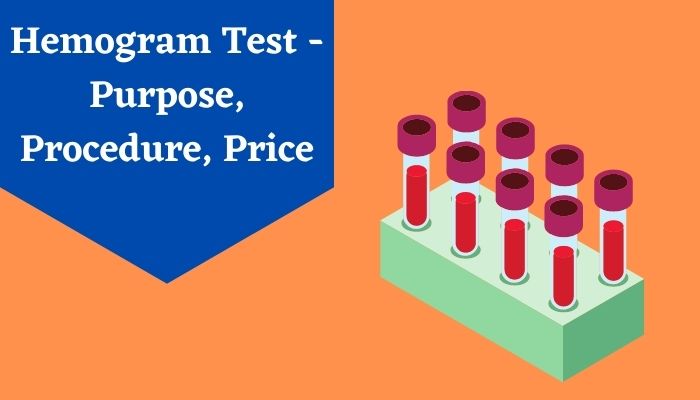What is Hemogram Test?
A Hemogram test or a complete hemogram blood test is a group of tests that measures any signs of disease or infection in the body. This hemogram blood test detects even the smallest signs of abnormalities and offers imperative information about the signs or causes of an illness. A complete hemogram test primarily consists of three components: Red Blood Cells (RBCs), White Blood Cells (WBCs), and Platelets. The prime objective of a complete hemogram test is to monitor the overall health condition of elderly people.A hemogram test price is Rs. 200-Rs.400. The price may differ as per your requirements and location.
You can get complete information about the hemogram test by visiting the LivLong website and typing hemogram test, haemogram test, complete hemogram test, hemogram blood test, hemogram, etc.
Hemogram Blood Test : Summary
| Also known as | Hemogram test, complete blood count |
| Test Type | Blood |
| Hemogram test includes | WBC, RBC, Platelet, and ESR |
| Preparation | No specific requirements |
| Reporting | Within 24 hrs |
| Test price | The price for this test is between Rs. 200 – Rs. 400 |
| Also included in | Health Insurance Plans |
| Related tests | blood sugar test, kidney function test, liver function test. C-reactive protein (CRP) |
Hemogram Test : Purpose
A hemogram test is usually performed to monitor the overall health condition of elderly people. This test measures the below-mentioned health problems and chronic diseases in elderly patients.- Cancer
- Arthritis
- Dehydration
- Heart problems
- Bleeding disorders
- Autoimmune disorders
- Infection or inflammation
- Problems in Bone Marrow
- Anemia (low Hemoglobin)
- Platelet Crit (PCT)
- Mean Cell Volume (MCV)
- Mean Platelet Volume (MPV)
- Peripheral Smear Examination
- Platelet Large Cell Ratio (P-LCR)
- Platelet Distribution Width (PDW)
- Total count of WBC, RBC & Platelets
- Erythrocyte Sedimentation Rate (ESR)
- Packed Cell Volume (PCV) OR Hematocrit (HCT)
- Mean Cell Hemoglobin (MCH) & it's Concentration [MCH meaning in blood test is the average amount in each of your red blood cells of a protein called hemoglobin]
- RBC Distribution Width-Standard Deviation (RDW-SD)
- RBC Distribution Width-Coefficient of Variation (RDW-CV)
- Absolute count of Neutrophils, Lymphocytes, Monocytes, Eosinophils & Basophils
- Differential count of Neutrophils, Lymphocytes, Monocytes, Eosinophils & Basophils
Hemogram Blood Test : Preparation
A hemogram test test doesn’t demand any special preparation and can be performed on a sample of blood. But some factors may interfere with the test results. These factors could be:- Some medicines like diuretics, antibiotics, steroids, etc.
- Pregnancy
- Some types of allergies
- High Triglyceride level
- Smoking,
- Stress
- Vigorous exercise
What to Expect During a Hemogram Test?
During a hemogram test consultation, you can expect the following:- Review of symptoms: The healthcare provider will ask you about any specific symptoms or concerns you may have related to your health.
- Medical history discussion: The healthcare provider will review your medical history, including any previous diagnoses, medications, surgeries, or relevant family medical history.
- Test explanation: The healthcare provider will explain the purpose and procedure of the hemogram test, including what it measures and how it is performed. They may also address any specific concerns you have regarding the test.
- Blood sample collection: The healthcare provider or a phlebotomist will collect a small sample of your blood, typically from a vein in your arm. The procedure is relatively painless. and usually quick.
- Laboratory analysis: The collected blood sample will be sent to a laboratory for analysis. The results may be available on the same day or may take a few days, depending on the laboratory's processing time.
- Result interpretation: Once the results are available, the healthcare provider will interpret them for you. They will explain what the different values mean and whether any abnormalities or concerns are found. If necessary, they may order additional tests or refer you to a specialist for further evaluation.
- Discussion of treatment or follow-up: If any abnormalities are detected, the healthcare provider will discuss potential treatment options or recommend further investigations or follow-up appointments.
Also Read : What Is The ESR Blood Test
Hemogram Test : Procedure
A hemogram test is carried out by taking the blood sample of an individual. There are no special requirements to perform the test. Let’s take a look at the hemogram test procedure.- First, you need to visit your nearby hospital or pathology lab.
- The lab technician will clean the area of your arm (preferably the upper arm) from where the blood should be collected.
- He will tie an elastic band around your upper arm to enhance the blood pressure and easily identify the vein.
- A needle syringe is inserted to collect the blood sample from the vein
- The elastic band is removed after blood collection
- The collected blood will be accumulated in a container for further testing
- You will get the result within a day
Hemogram Test : Normal Values
If your hemogram test values come within the normal range, then this indicates you are a healthy person. But if the values are above or below the normal range, then you should consult a doctor and follow all the medications.| Variables | Values |
| Hematocrit or Packed Cell Volume | 36% to 46% |
| Hemoglobin | Male = 14-17.5 g/dl Females = 12-15 g/dl |
| Red Blood Cells Count | Male = 4.5 - 5.9 x 106 Females = 4.5 - 5.1 x 106 |
| Mean Cell Volume | 80 - 96 µm |
| Mean Cell Hemoglobin | 27 - 33 pg |
| Mean Cell Hemoglobin Concentration | 33 - 36 % |
| Red Blood Cells Distribution Width | 39 - 46 fL |
| Platelet Count | 150 - 450 X 103 / µL |
| Platelet Distribution Width | 8.3 - 25 fL |
| Mean Platelet Volume | 8.6 - 15.5 fL |
| Platelet Large Cell Ratio | 11.9 - 66.9 % |
| White Blood Cell Count | 4,5 - 11 x 109 /L |
| Monocyte | 4% |
| Neutrophil | 56% |
| Lymphocyte | 34% |
| Eosinophils | 2.7% |
| Monocyte Absolute Count | 0 - 800 /1800 - 7800 /µL |
| Neutrophil Absolute Count | 1800 - 7800 /µL |
| Lymphocyte Absolute Count | 1000 - 4800 /µL |
| Eosinophils Absolute Count | 0 - 450 /µL |
| Basophils Absolute Count | 0 - 200 /µL |
| Erythrocyte Sedimentation Rate | 0 - 20 mm/hr |
| RBC Distribution Width-Coefficient of Variation | 11.6 - 15% |
References:
- What does a hemogram say to us?. National Library of Medicine [Internet]. https://pubmed.ncbi.nlm.nih.gov/32684755/. Accessed Feb 20, 2022.
- Complete Blood Count with Differential. University of Rochester Medical Center [Internet]. https://www.urmc.rochester.edu/encyclopedia/content.aspx?contenttypeid=167&contentid=complete_blood_count_w_differential. Accessed Feb 25, 2022.
- Complete Blood Count (CBC) Test and Results. eMedicineHealth [Internet]. https://www.emedicinehealth.com/complete_blood_count_cbc/article_em.htm. Accessed Feb 27, 2022.
- Complete Blood Count (CBC). Stanford Health Care [Internet]. https://stanfordhealthcare.org/medical-tests/b/blood-test/types/cbc.html. Accessed Mar 01, 2022.

